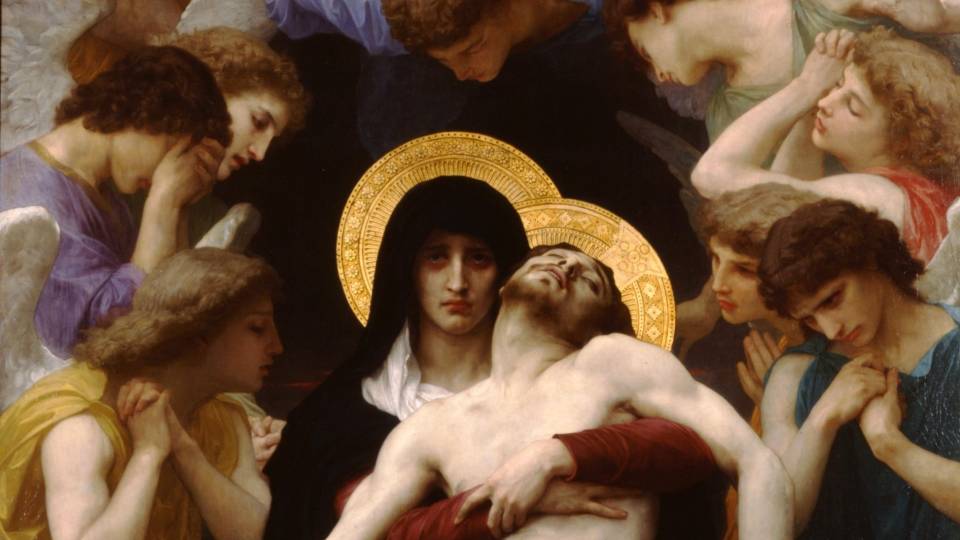



God’s favourite habit: transforming evil into good
Julian Paparella
Thursday, February 20, 2020

Detail of Pietà by William-Adolphe Bouguereau (Source: Wikimedia Commons)
God’s favourite habit: transforming evil into good
Sunday, February 23, 2020 - Seventh Sunday in Ordinary Time, Year A
Have you ever tried loving someone who hated you? Have you ever given a gift to someone who you knew had stolen from you? Have you ever kept doing good for someone who was hurting you?
These are not easy experiences. They are certainly not things we want to experience. But what do we do when these situations arise in our lives? What approach do we take?
So often in life, difficult and hurtful experiences can leave us resentful, disappointed, and bitter. We can have the tendency to turn in on ourselves, away from the one who has hurt us, and harbour the same hatred towards him or her that he or she has made us feel.
Jesus shows us another path. Jesus does not want us to experience evil and hurt at the hands of other people. Rather, he gives us a blueprint for how to deal with these difficult experiences when they arise in our lives. In the Gospel for this Sunday, Jesus gives his disciples instructions that seem to go against ordinary common sense. He tells them to “turn the other cheek” when someone strikes them. He tells them to love their enemies and pray for those who hurt them. He tells them to go the extra mile to be loving, generous, and compassionate (Matthew 5:38-48).
Loving our family and friends can sometimes already be a challenge. How can we possibly love our enemies? Jesus is not calling us to remain in toxic relationships or to turn a blind eye to other people’s destructive behaviour. Rather, he is telling us to not reciprocate the evil that is around us: to turn it into good instead.
A beautiful image of this is Mary standing at the foot of the Cross. This is a mother who is witnessing the torture and brutal killing of her Son, right before her very eyes. She could very easily resort to reciprocating the violence, hatred, bitterness, and anger that her Son is receiving. Instead, she stands by, sorrowfully but with hope. She transforms the evil she sees around her and refuses to let it leave her unchanged. She does not return violence for violence. She does not allow her heart to become a place where anger and revenge fester and grow. How is this possible?
Only God can make good come out of evil. This is true even in the very concrete circumstances of our lives: God can bring good out of the evil that is around us. He made eternal life spring from the death of Jesus. He makes good spring up from bad situations; he shines light where there is only darkness. His ability surpasses our wildest imagination. The question is: how can we allow God to act in our lives in this way? How can we let God turn the bad things we experience into sources of good?
This does not mean continuing to endure things that destroy us. This means transforming the bad things in our lives so they are no longer destructive. It means no longer hanging on to grudges. It means replacing our negative thoughts about ourselves and others with positive thoughts instead. It means offering our limits and misunderstandings to God and letting Him work His power in our weakness.
If we have difficulty forgiving people, we can always ask God’s help. If we are being hurt by someone, we can always pray for that person – not so that they continue the evil they are doing, but so that we do not harbour hurtful feelings towards them that end up only destroying ourselves. Loving people can sometimes mean putting boundaries between us and them. Sometimes our good and the good of the other person means having little or no contact. The point is not to allow ourselves to be victimized by other people. Rather, the point is to not allow ourselves to fall victim to our own negative attitudes towards others. Most often, bad emotions in us are even more harmful for ourselves than they are for anyone else.
God does not want evil things for us. He is not the source or the cause of the bad things in our lives. Rather, He wants to transform the evil that we experience so that it is no longer evil but good. This is His modus operandi. It is like turning a tragic site into a place of remembrance, or channeling failure into greater motivation to succeed. How can we let God transform the evil that is in us and around us into good, so that we can escape what weighs us down and live more and more in the peace and freedom that God wants to give each one of us? What are the specific relationships and situations in our lives where God wants to sow His forgiveness, healing, and redemption?
Julian Paparella has contributed to Salt + Light Media since 2012. He served as an intern for many summers and currently studies theology at the Institut Catholique de Paris.
Julian Paparella has contributed to Salt + Light Media since 2012. He served as an intern for many summers and currently studies theology at the Institut Catholique de Paris.
Related Articles:
<<
SUPPORT LABEL
$50
$100
$150
$250
OTHER AMOUNT
DONATE
Receive our newsletters
Stay Connected
Receive our newsletters

Stay Connected







